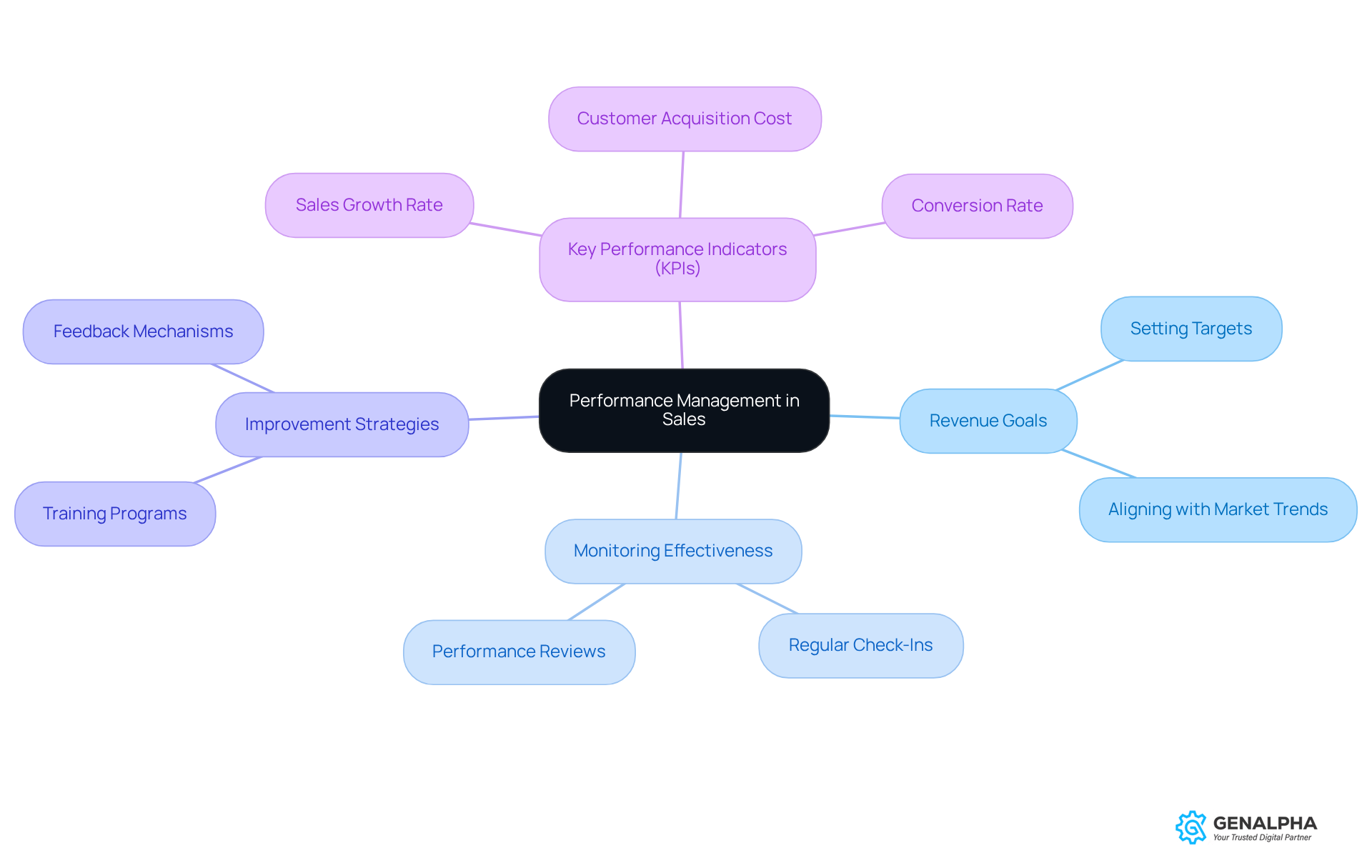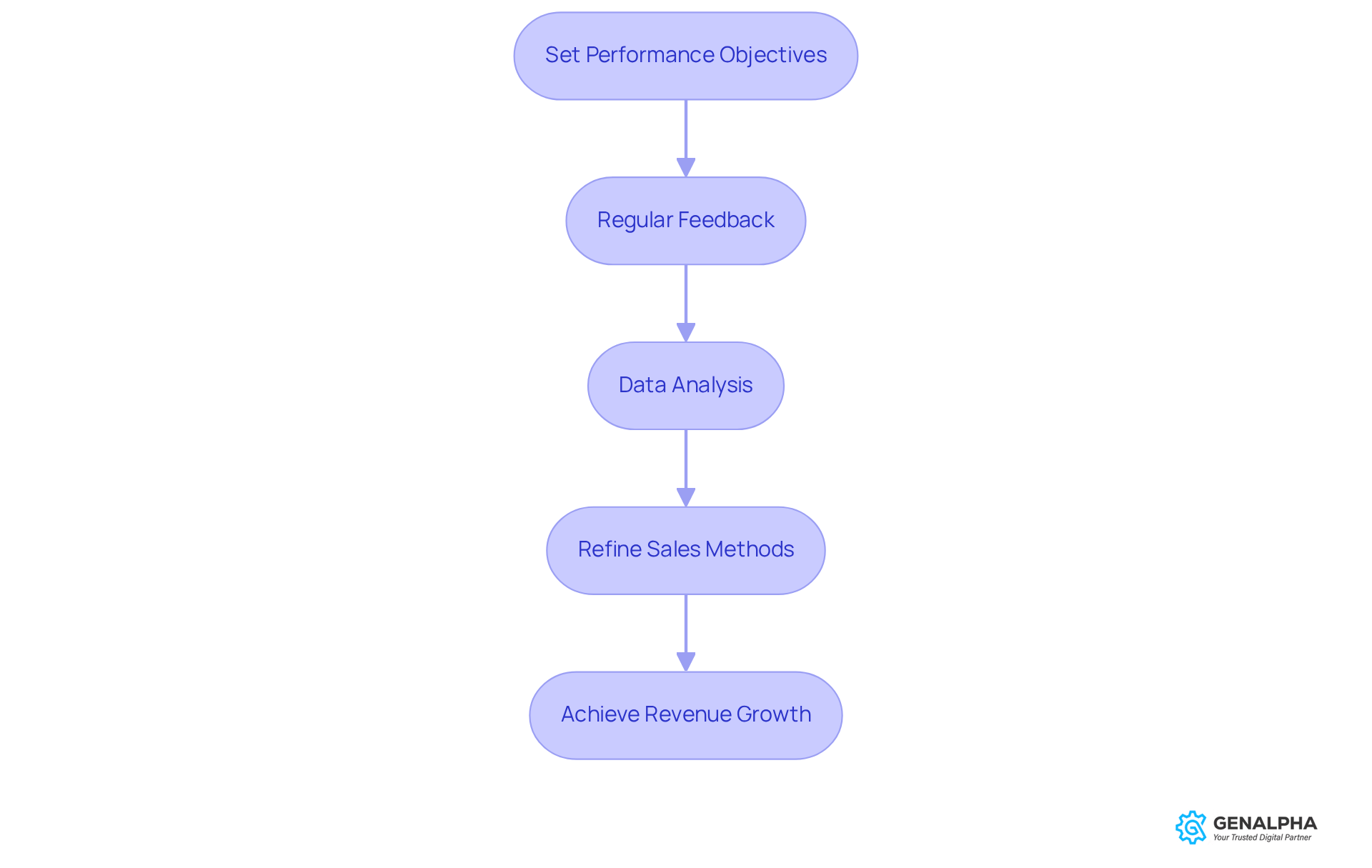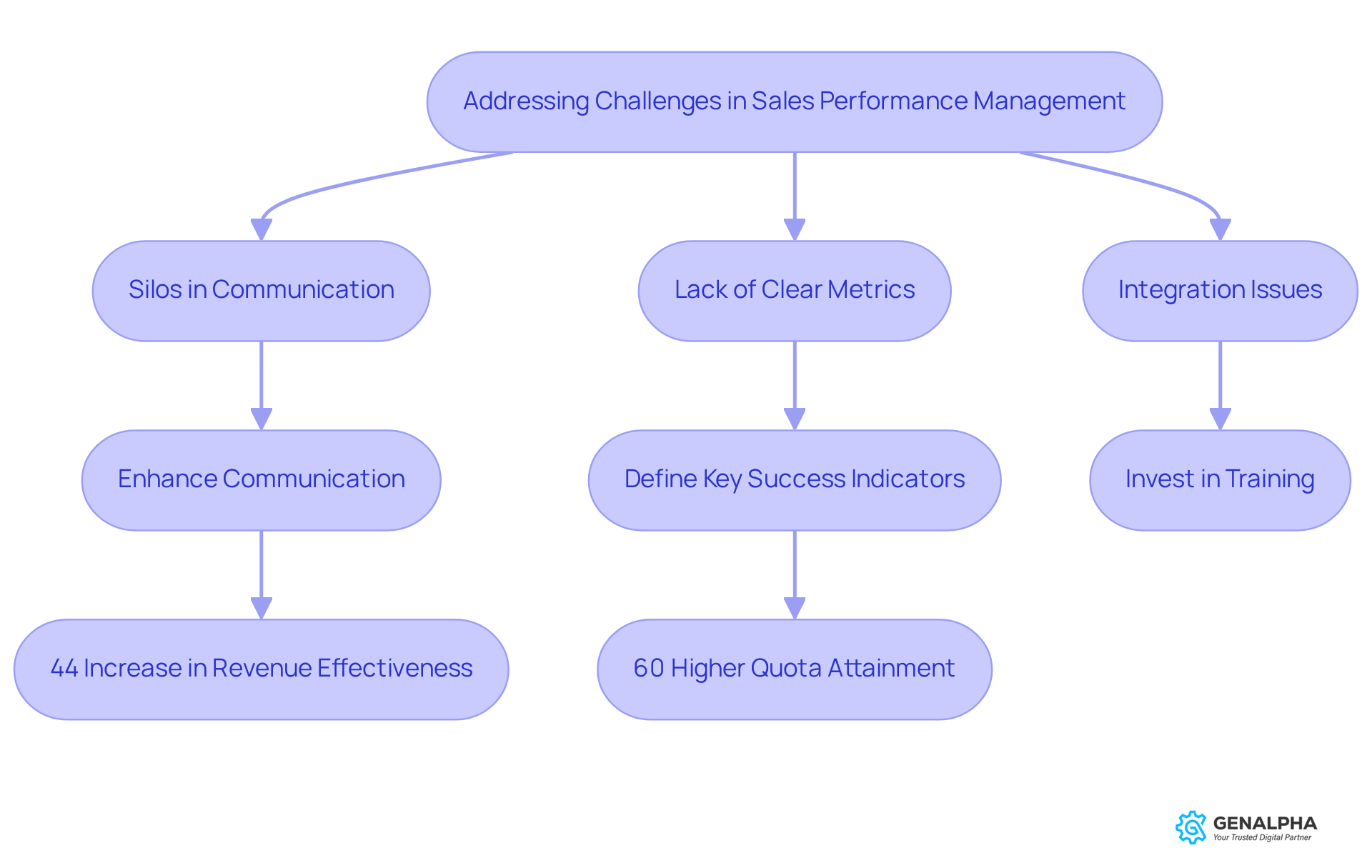Overview
Performance management in sales for manufacturers is super important for making sure that sales strategies match up with the bigger business goals. It helps us keep track of how things are going and make improvements through key performance indicators (KPIs).
You know what’s really cool? When companies nail their performance management, they often see some serious revenue growth! In fact, data shows that those who implement these strategies tend to achieve better outcomes and boost their sales effectiveness.
So, have you thought about how your own performance management could make a difference? Let’s dive in and explore how aligning these strategies can lead to amazing results!
Introduction
Understanding the dynamics of performance management in sales is super important for manufacturers who want to thrive in a competitive landscape. This approach not only helps align sales strategies with broader business goals but also boosts accountability and nurtures a culture of continuous improvement.
But let’s be real—the road to effective performance management isn’t always smooth. There are challenges like siloed teams and unclear metrics that can trip us up.
So, how can manufacturers tackle these complexities to unlock their full sales potential and drive significant revenue growth? Let’s dive in!
Define Performance Management in Sales
Performance management in sales involves monitoring the effectiveness of a sales team and identifying strategies for improvement. Think of performance management in sales as setting revenue goals, checking in on how those goals are being met, and then coming up with smart strategies to boost results. In manufacturing, this process is super important because it helps connect marketing efforts with what can actually be produced and what customers want. This way, manufacturers can meet customer needs efficiently.
To really gauge effectiveness, we often turn to key performance indicators (KPIs). These metrics help us see how both individuals and teams are contributing, allowing for decisions that are backed by data. So, how can your team improve its performance management? It starts with understanding these processes and using them to your advantage. What do you think could work best for you?

Explain the Importance of Performance Management in Sales
Have you ever wondered how performance oversight in marketing can make a difference for producers? It’s really all about creating a systematic way to align sales plans with broader business goals using performance management in sales. When marketing teams focus on essential objectives, it not only boosts accountability but also helps representatives understand the metrics that evaluate their results.
Imagine an environment where ongoing enhancement is the norm. With regular feedback and evaluations, performance management in sales can leverage to refine sales methods and approaches. In a world where customer demands change rapidly, effective performance management in sales enables producers to adapt quickly, fine-tune their sales processes, and significantly increase revenue growth.
Did you know that businesses using Sales Performance Management (SPM) methods often see three times greater yearly revenue growth than those that don’t? Plus, over 81% of sales representatives hit their annual targets in companies that embrace SPM. This really highlights how crucial this approach is for achieving financial success. So, why not consider integrating performance oversight into your marketing strategy? It could be the game-changer you’ve been looking for!

Address Challenges in Sales Performance Management
For producers, performance management in sales can be quite a challenge, especially when it comes to aligning revenue targets with broader organizational goals. Have you ever noticed how sales teams often work in silos? This can lead to miscommunication and a fragmented strategy, making things even trickier. Plus, without clear metrics, our performance management in sales makes evaluating effectiveness a guessing game, leaving us unsure of how well we’re really doing. And let’s not forget how integrating evaluation tools with existing systems, like ERP software, can hinder efficient data gathering and analysis.
So, how can manufacturers tackle these hurdles?
- Focusing on clear communication among departments is key.
- Setting well-defined key success indicators (KSIs) that align with overall business objectives is crucial for performance management in sales.
- Investing in training for sales teams is vital to ensure they fully understand performance management in sales and its importance in achieving organizational goals.
For instance, companies that implement customized incentive plans have seen a whopping 44% increase in revenue effectiveness! And those with effective onboarding programs achieve 60% higher quota attainment. This really highlights how can drive overall success.
Real-world examples really bring these strategies to life. Take Schneider Electric, for instance. They revamped their commerce processes by implementing Spaulding Ridge's Anaplan Territory Planning solution, resulting in improved efficiency and data-driven decision-making. Bryan Stevens from Schneider Electric emphasizes the urgent need for a robust integrated business planning system to facilitate this data-driven approach. By proactively addressing these challenges, manufacturers can significantly enhance their sales performance through performance management in sales and align better with their operational goals, ultimately driving growth and profitability. What steps will you take to improve your sales strategy today?

Conclusion
Performance management in sales is super important—it really connects those sales efforts with bigger business goals, especially in the manufacturing world. When manufacturers put effective performance management strategies into action, they not only boost their sales processes but also make sure they’re meeting customer demands efficiently. This kind of alignment creates a culture of accountability and continuous improvement, which can lead to greater revenue growth.
Throughout this article, we’ve shared some key insights on how to manage sales performance effectively:
- Setting clear revenue goals
- Using key performance indicators (KPIs)
- Encouraging communication among departments
Plus, look at real-world examples like Schneider Electric’s success with integrated planning systems. These stories show how tackling common challenges can really improve sales outcomes. Data reveals that organizations adopting Sales Performance Management (SPM) methods often see significant financial benefits, highlighting the value of this approach.
So, let’s not underestimate the importance of performance management in sales. It’s a vital tool for manufacturers to adapt to changing market conditions, refine their strategies, and drive growth. By proactively addressing challenges and implementing best practices, manufacturers can enhance their sales effectiveness while aligning with overarching business goals. Taking actionable steps to refine performance management strategies today can set the stage for sustained success in the future. What steps will you take to improve your sales performance?
Frequently Asked Questions
What is performance management in sales?
Performance management in sales involves monitoring the effectiveness of a sales team, setting revenue goals, and developing strategies to improve results.
Why is performance management important in manufacturing?
In manufacturing, performance management is crucial as it helps align marketing efforts with production capabilities and customer demands, ensuring that manufacturers can efficiently meet customer needs.
How do key performance indicators (KPIs) relate to performance management?
KPIs are metrics used to assess how individuals and teams contribute to sales goals, enabling data-driven decision-making to enhance performance.
What is the first step to improving performance management in a sales team?
The first step is to understand the performance management processes and utilize them effectively to enhance team performance.




